The calendar showed January 24, 2012, when it became known that Thodoros Angelopoulos was no longer alive. That Tuesday afternoon, the Greek director had been carried away by a motorcycle on the Drapetsona ring road, while crossing the road, during one of the breaks in the filming of his new film, "The Other Sea". He was transferred with considerable delay to a hospital in Faliro, very seriously injured and a few hours later he succumbed, at the age of 77.
On the occasion of the completion of ten years since his death, the Magazine today attempts a brief recording and evaluation of his course and contribution in the field of the seventh art, where he touched the heart of social reflection like few others, approaching with a poetic "impulse" the reality, which may have seemed trapped in the frame, but lived and breathed outside of it, intangible, dreamlike, sometimes tragic, but always primarily human.
THE FIRST STEPS:ATHENS, PARIS, ATHENS
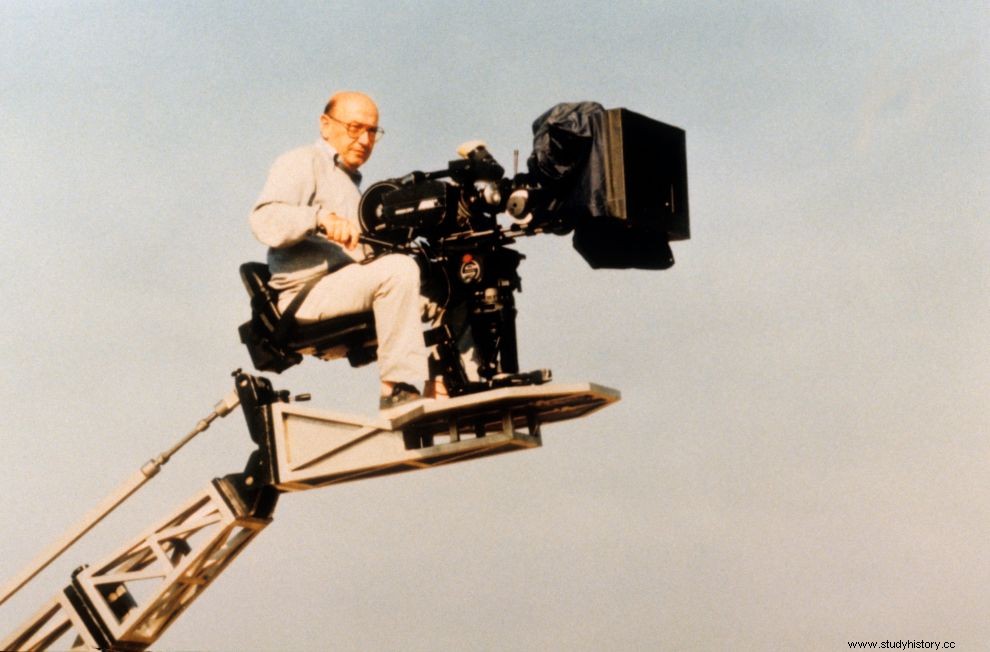
Thodoros Angelopoulos brought a wind of change to the Greek - and not only - cinema, giving us a rare "reading" of a pioneering concept in the emotional dimension of creation, which found its extension in the "weight" and the melancholy of the gaze that simultaneously looks at the History, Soul and Nature. His expressive elements "clothed" the structure of his films with a lyrical narrative, which in turn, liberated the meanings, highlighting the identity of his heroes and the inner core of their consciousness.
Born in 1935 in Athens, he went to the 2nd Boys' Gymnasium, where he had classmates Lefteris Papadopoulos and Alekos Fassianos, at the age of 18 he started studying law, but left it when he was on his degree, to travel to Paris in 1961, where he attended courses in French philology and filmology at the Sorbonne, but also ethnology with Claude Lévi-Strauss. In 1962 he passed exams at the famous IDHEC film school, but a disagreement with his directing professor led to a conflict, resulting in him interrupting his studies.

He then attended classes at the Musee de l'Homme and was taught cinema-directing by the ethnologist and director Jean Roux. In 1964 he returned to Greece, where he was unnecessarily beaten in the street by policemen, which affected him and his plans. While everyone expected him to leave again for France, Angelopoulos accepted Tonia Marketakis' proposal to work as a critic in the left-wing newspaper "Democratic Change", where he also met Vassilis Raphaelidis.
In 1965, Vangelis Papathanasiou proposed to him to make a film about the Forminx group, to promote their tour in America. In Thessaloniki, at the "Palais de Sport", the now 30-year-old Angelopoulos made his first film, at a Forminx concert in front of 8,000 spectators. Ultimately the tour was cancelled, the project fell apart and "Forminx Story" was never finished. Three years later, in 1968, he presented his first film, the short "Ekpopi" which participated in the Thessaloniki Festival, winning the critics' prize.
"REPRESENTATION" (1970)

On September 1, 1969, the first issue of the historical magazine "Synchronos Kinematografos" was published, with co-founders Thodoros Angelopoulos and Vassilis Raphaelidis, and Pantelis Voulgaris as a direct collaborator, thus giving a "step" to the so-called New Greek Cinema. And thus we arrive in 1970, when the director shot his first feature film, "Representation", where it was immediately realized that thematically and structurally, based on a crime in a mountain village in Epirus, Angelopoulos, through the mechanism of "subversiveness", mobilized a idiosyncratic realism, loaded with permanent ruptures arising from a pioneering understanding of meanings and images.
A rare as well as decisive role in the palette of the director's complex level of perception was played by the photography of Giorgos Arvanitis, who rendered the "frame" with a gentle theatricality, a simple musicality, a lyrical dimension, "forcing" the viewer to pay attention and finally to surrender to every possible "shade" of the image, to the large shots that led to a dive into the interior of reality and fantasy and that became a trademark of Angelopoulos' films. "Representation" was awarded both in Greece and abroad, arousing the interest of the public and critics for the first-time director.
THE HISTORY TRILOGY (1972-1977)
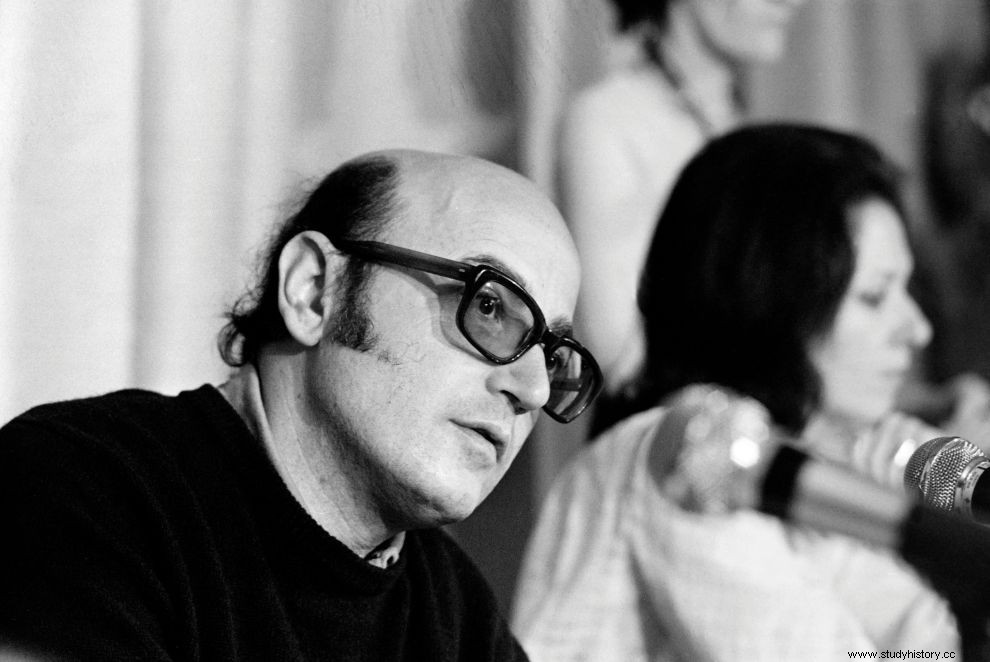
Immediately after, Angelopoulos tackled his first trilogy, that of History, with "Days of '36" (1972), "The Troupe" (1975) and "The Hunters" (1977). In the first of these, the director dealt with the causes that led to the dictatorship of Metaxas, cleverly letting his political view, the ideological intention of the film and his skilfully hidden comment in relation to the dictatorship of the colonels to be floated. He continued with "Thiasos", perhaps his personal masterpiece and probably the leading film in the history of Greek cinema.
A traveling "group" playing "Golfo", the well-known comedy by Spyros Peresiadis, is the starting point for a complex world of signs, referring to the most important historical events of our country from 1939 to 1952 (Greek-Italian war, occupation , liberation, civil), with schematic references to the House of Atreides. Angelopoulos created the necessary social and political vibrations, "boring" the atmosphere in a pervasive climate of tension and abandonment, but also of existential sentimentality that refuses "truce".
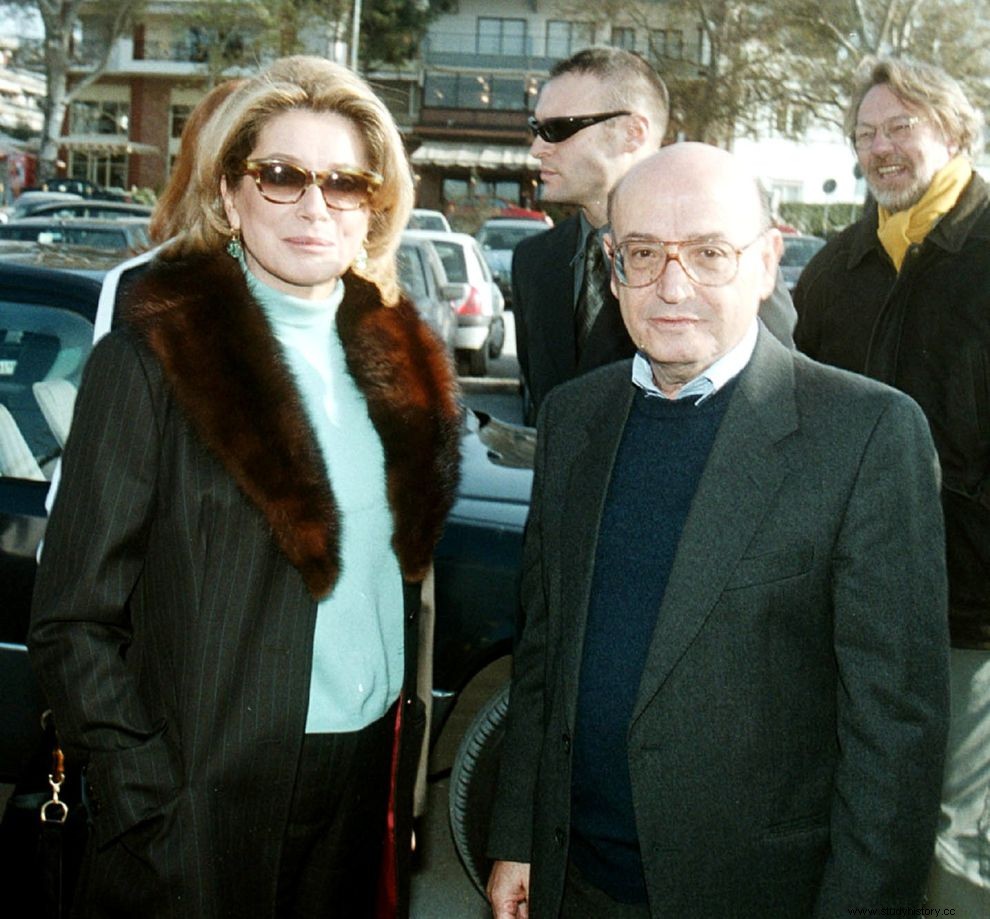
"Thiasos" swept the awards at the Thessaloniki Festival, while it would have been the official Greek entry at the Cannes Festival of the same year, but the Karamanlis government managed to prevent it, considering that the film "unilaterally presented the recent reality", i.e. from a leftist point of view. What is certain is that "Thiasos" caused a great sensation abroad, ensuring worldwide recognition for the director. The trilogy was completed two years later, with "The Hunters", an "exercise" in symbolism, penetration into the dramatic element of death and realistic "photography" of Angelopoulos' personal perspective.
The trauma of the civil war, which still bleeds three decades later, opens a dialogue with reality through a "parable", in which the bourgeois hunters face questions that overturn any rationality, leading to a personal questioning of their own conscience, in front of the corpse of a rebel, who disturbs memories, passions and nightmares of the past. The film was nominated for the Palme d'Or at the 1977 Cannes Film Festival (the award was won by the Taviani brothers' "Father Master").
"ALEXANDER THE GREAT" (1980)
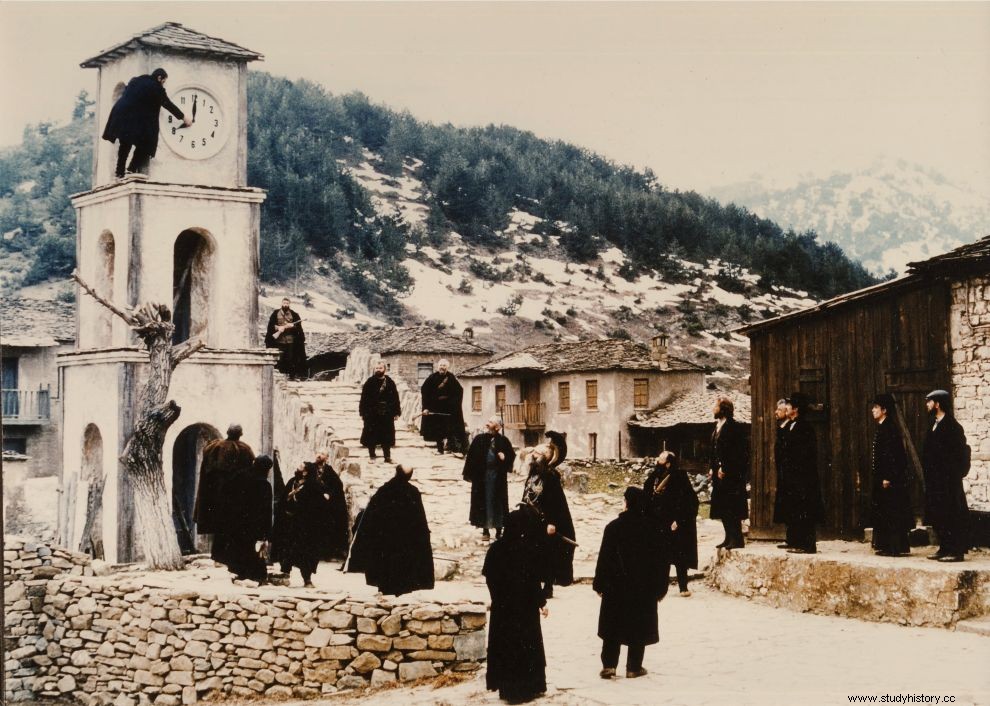
After the history trilogy, Angelopoulos shot in 1980 "Alexander the Great", one of the longest Greek films (230' the original copy), in which he began his collaboration with foreign actors. The story of Alexander (Omero Antonuti), a bandit at the beginning of the 20th century, is used by the director as a field of ideological confrontations of the left, through the extremely charged behavior of the "heroes", which lurks in the background of the historical scene.
The once again excellent photography of Arvanitis, charged the four hours with an "isolation" of artistic harmony both in space and time, changing the outside world with wandering symbolism that touched the definition of cinematic elegy. The simple "conditions" of Angelopoulos's camera were expressively harmonized with the aesthetic flow of photography, releasing the clarity of the film and offering us rare sequences of colors and emotions.
THE SILENCE TRILOGY (1984-1988)
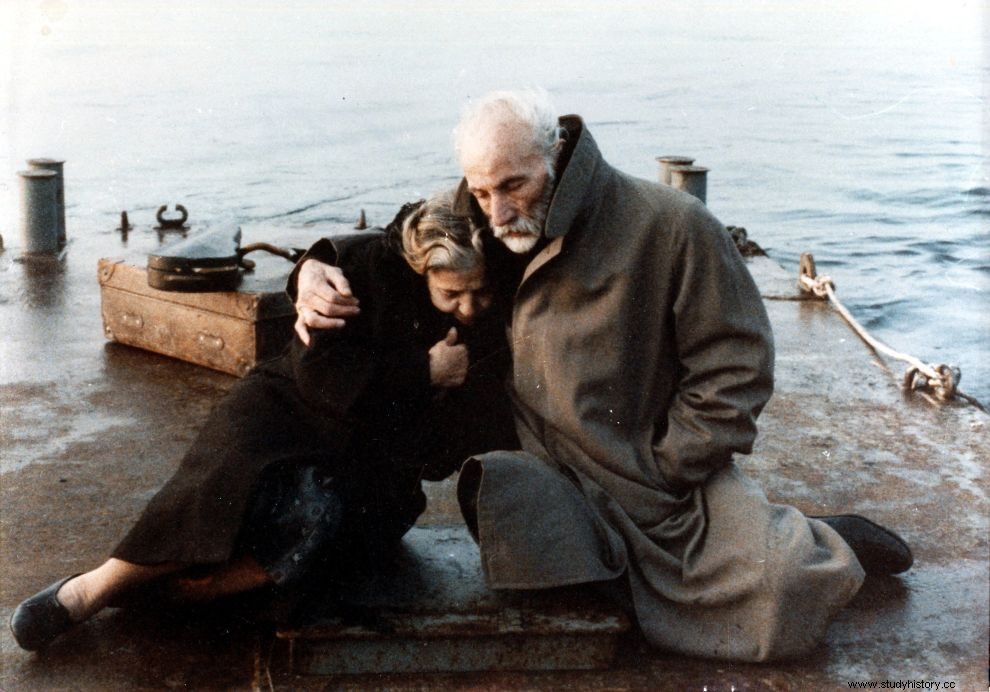
After "Alexander the Great", two documentaries for television followed, "One village, one inhabitant" (YENED, 1981) and "Athens, return to the Acropolis" (ERT, 1983) and immediately after that began the trilogy of silence, with "Journey to Kythira" (1984), "The Beekeeper" (1986) and "Landscape in the Mist" (1988). Putting himself in the script for the first time, Angelopoulos presented in "Journey to Kythira", a "silent" drama, the return of a political refugee to Greece after 32 years of exile in the Soviet Union.
The arrival of Spyros (Manos Katrakis in the last role of his life, as well as Dionysis Papagiannopoulos, both died a few months later), describes a journey to a utopian world, where the protagonist feels like a foreign body, unable to adapt to the Greek reality, with Arvanitis creating continuous landscapes of "nightmarish" dreams and Angelopoulos flirting with the limits of poetry behind the film camera, in one of the top examples of his career.
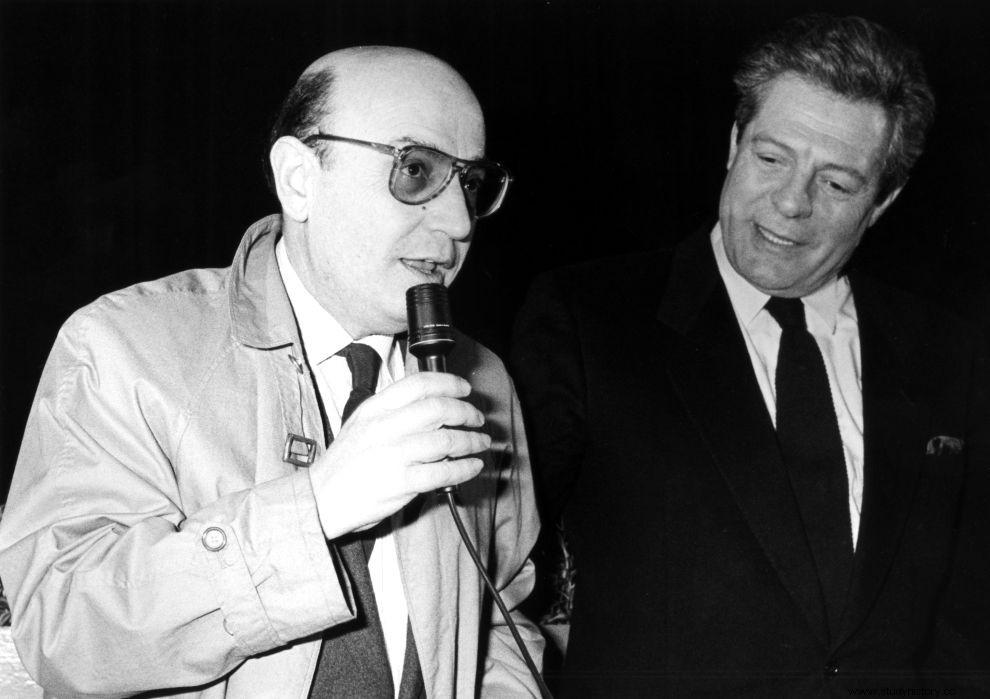
The escape, the margin, the dark shades of the past, the existential impasses, the cracked mirrors of the soul, together with the so intimate music of Eleni Karaindrou (in her first collaboration with Angelopoulos), all these defined the space of the real in the relationship of the fantastic, in a film-station on the path of the director. The film won the screenplay and critics awards at Cannes, and was also nominated for the Golden Palm (losing to Wim Wenders' "Paris-Texas").
The trilogy of silence continued two years later, with "The Beekeeper" and starring Marcello Mastroianni, on a journey with his hives, following the path of the bees and the tradition of his ancestors, having given up everything:his work, the his house and his wife. His meeting with a new girl awakens in him memories and "traumatized" patterns of the past. The dialogues, trapped between the everyday and the symbolic, represent the "lost time" of the beekeeper, who feels his hourglass emptying irretrievably.
And this was followed by "Landscape in the Fog", a metaphysical psychological character sketch film, starring two brothers searching for their father in an unspecified Germany. The film evocatively captures the open road, where the paradox meets the unreal, in an inventive, "elliptical" proposal, with the photography of Arvanitis being shocking and the notes of Karaindros blending with the animate and the inanimate in the river bed , magically orchestrating the heavy load of drama.
THE BORDERS TRILOGY (1991-1998)
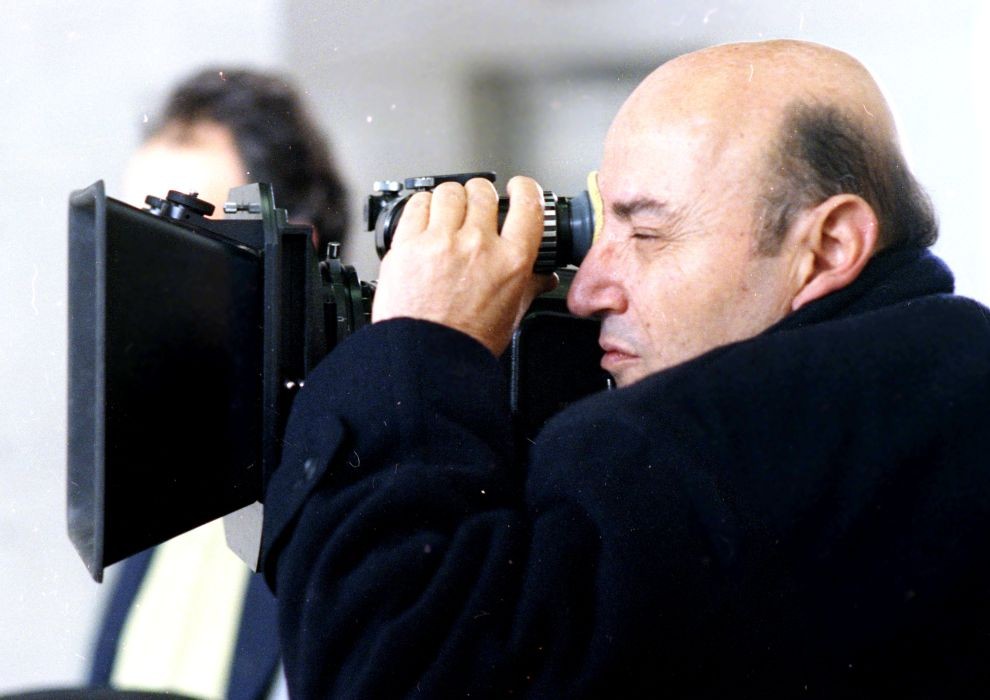
At the dawn of the 90s, Angelopoulos began the border trilogy, with "The meteoric step of the stork" (1991), "The gaze of Odysseus" (1995) and "An eternity and a day" (1998). In the first film, "The meteoric step of the stork", the uncertain reality balances in an undefined city, where an elderly politician (Marcello Mastroianni) has taken refuge, living ascetically, completely isolated between memory, time, decay and borders, where immigrants and refugees crowd around uncertainty and illusions.
During the filming in Florina, the then Metropolitan of Florina, Prespa and Eordaia, Augustinos Kantiotis, accused Angelopoulos of insulting the nation and Christianity through the film and threatened him with excommunication. The issue took on international dimensions, the director declared adamant and finally Kantiotis excommunicated both him and Mastroianni, giving them two years to repent and forgive, which none of them did. Finally the film was completed and made it all the way to the Cannes Film Festival.
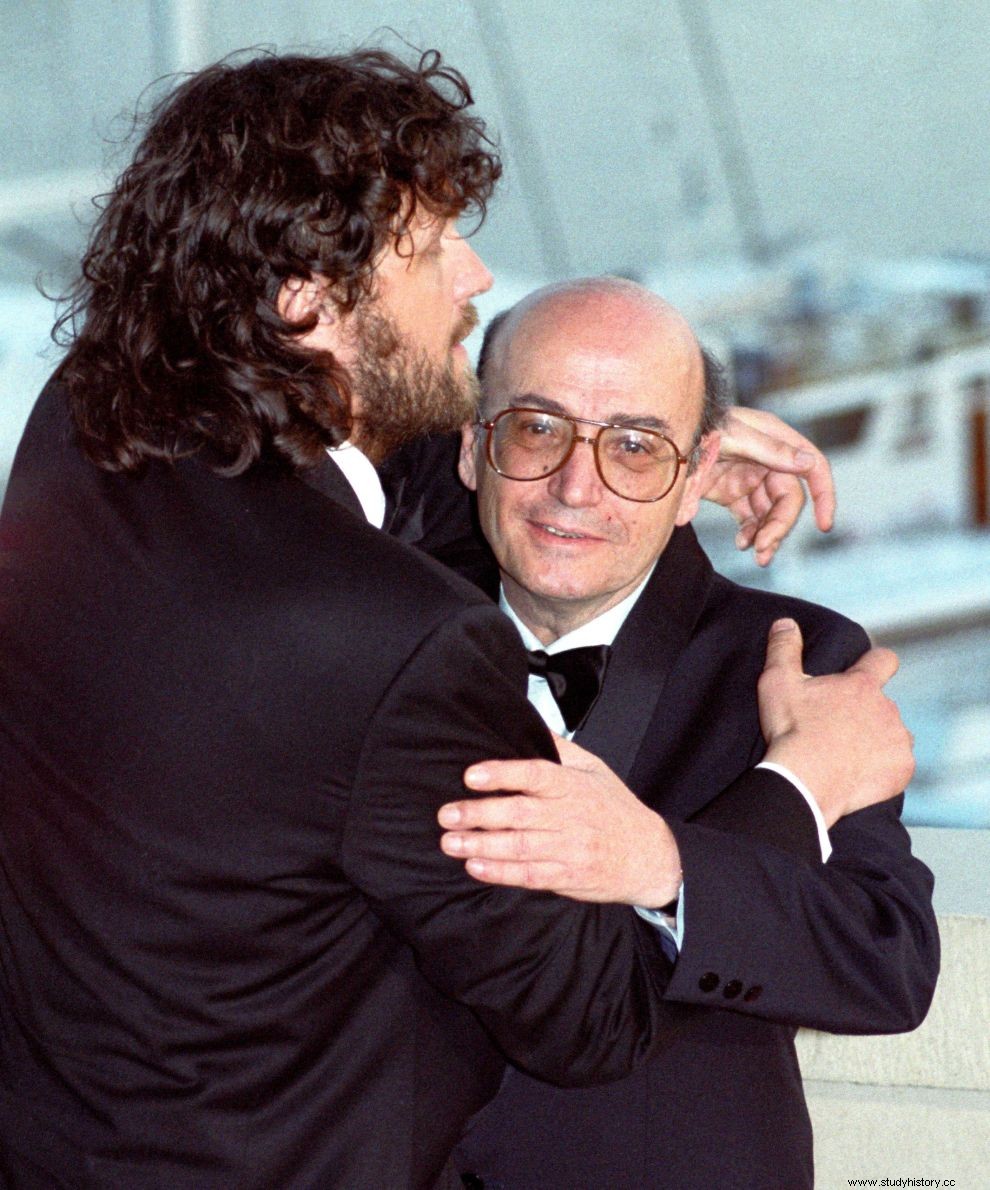
It was followed by "The Eye of Odysseus", with the hero of a Greek director (Harvey Keitel) who returns from exile after many years, in search of three lost reels of film by the Manaki brothers, pioneers of cinema in the Balkans at the beginning of the 20th century. The symbolism of the first "sight" ever recorded on the Balkan peninsula is transferred as an expressive necessity that illegitimates the script, seeking to narrate an adventure, at the moment when all ideologies collapse and the only thing that remains alive is the director's attempt to give breath in a new "look" that will interpret the world.
The film competed at the Cannes Film Festival, winning the Jury Prize, much to the dismay of Angelopoulos, who thought it deserved the Palme d'Or (given to Emir Kustouritsa for "Underground"). When he took to the stage to accept his award, he said clearly annoyed into the microphone, "if that's what you're going to give me, then I have nothing to say"! Finally, as it turned out, he had to wait three years for his dream to come true, with his next film, the last of the border trilogy.
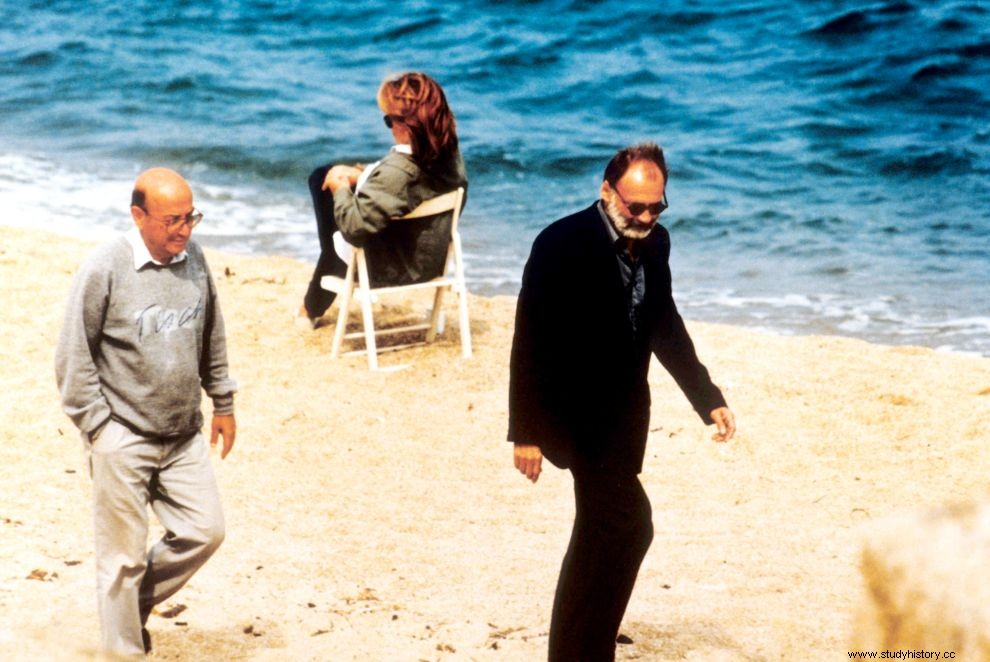
"An eternity and a day" is definitely one of the highlights of Theodoros Angelopoulos, a film of those that are called masterpieces. Alexander (Bruno Gants), a half-baked writer, deals with Dionysius Solomon's unfinished poem, "Free Besieged", trying to find and fill in the missing words. The reckoning of a life, with the end approaching, the resignation dictated by sad memories and determining his path to the tragic end, all this is postponed "for a day", when he meets a homeless boy, a child of the traffic lights.
The "frozen" eternity is extended, in an attempt to synthesize the two persons, with the outstandings that remain, expressed as life experience in this new relationship of fatal succession, as a final debt of the one who leaves to the one who will stay and it will continue. And here, both Arvanitis and Karaindrou undermine the appearance and highlight the emotion that constantly emanates through the structure of the film. Angelopoulos generously gives us a "look" that penetrates the perceptual corners of life.
THE TRILOGY OF MODERN GREECE (2004-2012)
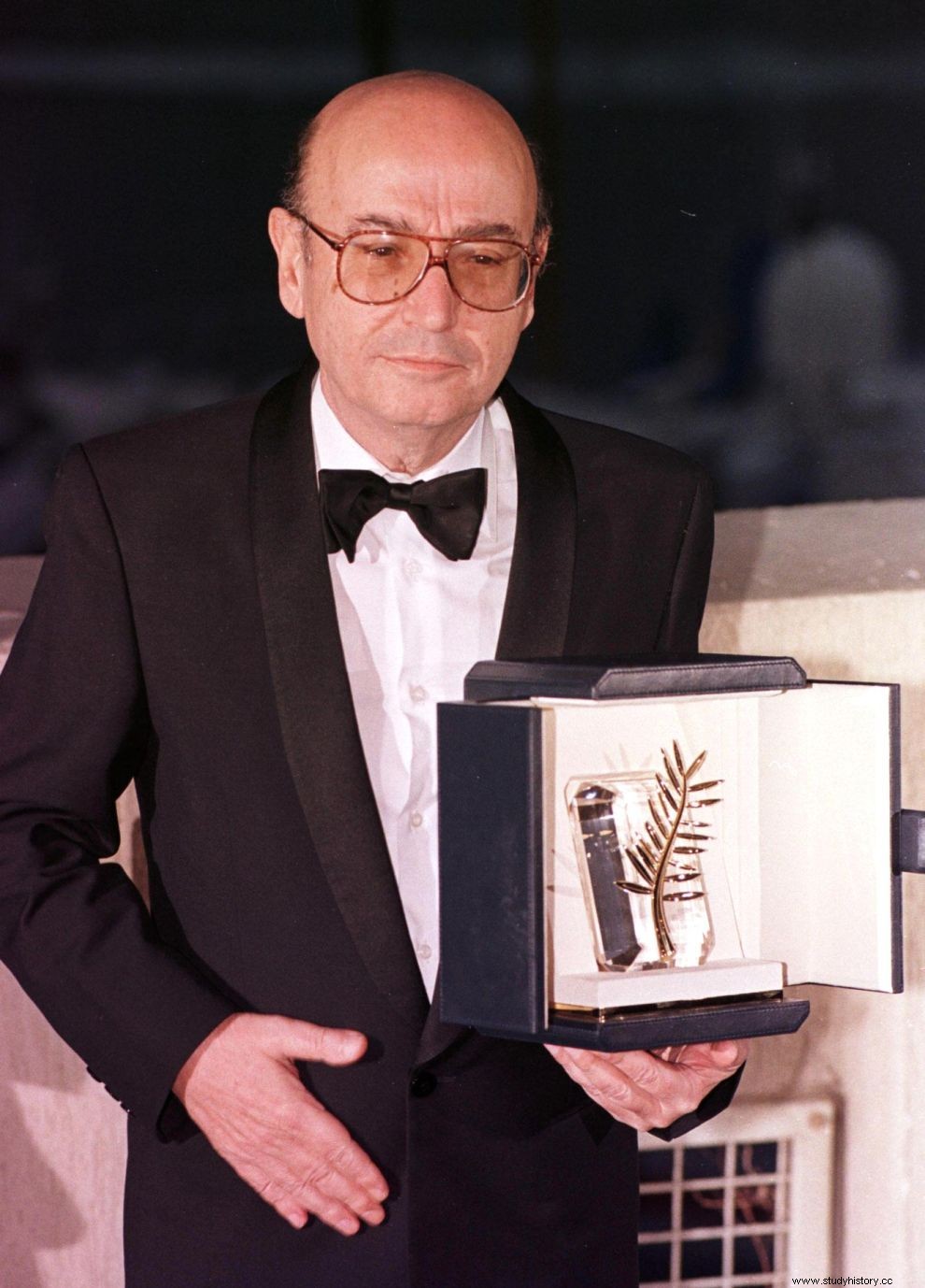
As we wrote above, the film won the Golden Palm at Cannes, swept the awards (7) at the Thessaloniki Festival and received rave reviews all over the world. Six whole years had to pass (the longest time between two films in Angelopoulos' career), until the director's next film, which was also the first of another trilogy, that of modern Greece, with "The Weeping Meadow" (2004 ), "The Dust of Time" (2008) and "The Other Sea" (2012), which was not completed, after Angelopoulos died during filming.
In "The Weeping Meadow", Angelopoulos deals with a group of refugees who leave Odessa in 1919 and arrive in Greece. Through the adventures of two step-sisters, Eleni and Alexis, the history of the country is outlined over a period of three decades, until 1949. On the one hand, the immigrant Alexis who is looking for a new life in America, and on the other, all its bitter stages dictatorship of Metaxas, the Occupation and the Civil War, in a frame-mirror of the director's beliefs towards the representation of social and political events, but also their psychological deepening.
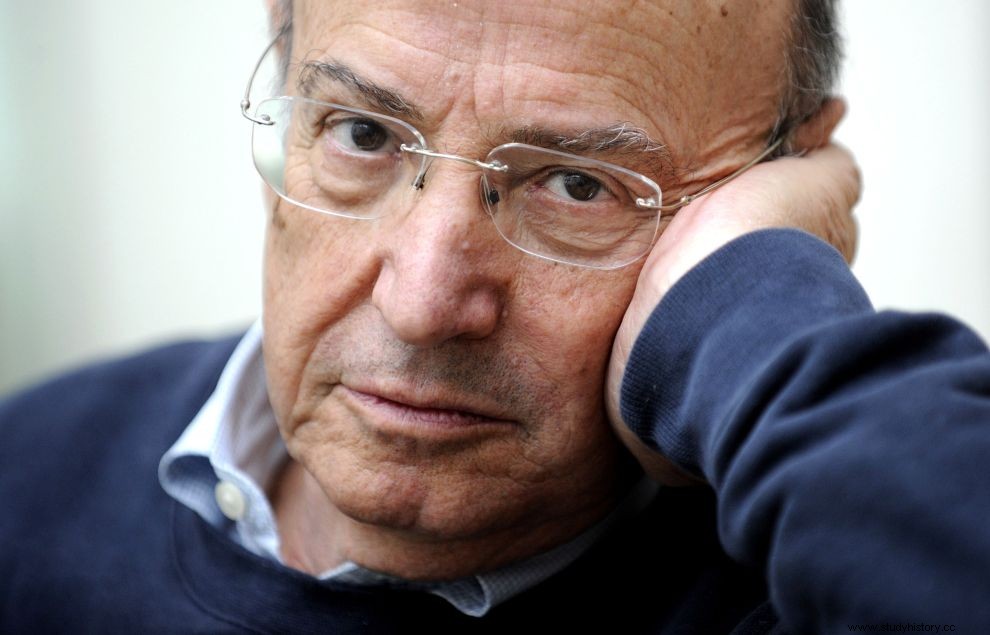
Four years later followed the second part of the trilogy, "The Dust of Time", about a Greek-American director (Willem Dafoe), who makes a film about his mother, Eleni. The story takes place in Italy, Germany, Russia, Kazakhstan, Canada and the USA. Angelopoulos's look at the claim of love perceives Helen "bound" in existential entanglement:survival, love, shots and fields "edited" with the rules of opposition, emotional impasses, "broken" perspectives.
And at the same time, the historical person and the political dimension in the events of the last fifty years that marked the 20th century, with the director "opening" a dialogue with the correspondence of myth and reality, through his favorite symbols, finally giving an interpretation to his ideological language. Η τριλογία θα ολοκληρωνόταν με την "Άλλη θάλασσα", τα γυρίσματα της οποίας ξεκίνησαν στο τέλος του 2011. Το κεντρικό θέμα ήταν η ελληνική κρίση, όμως όπως γράψαμε και στον πρόλογο, ο Θόδωρος Αγγελόπουλος πέθανε στις 24 Ιανουαρίου του 2012, υποκύπτοντας στα τραύματα που του είχε προκαλέσει η διερχόμενη μοτοσυκλέτα.
Η ΠΑΡΑΚΑΤΑΘΗΚΗ ΤΟΥ ΘΟΔΩΡΟΥ ΑΓΓΕΛΟΠΟΥΛΟΥ

Δέκα χρόνια μετά τον θάνατό του, ο κορυφαίος Έλληνας σκηνοθέτης στην ιστορία του ελληνικού κινηματογράφου, συνεχίζει να μαγεύει με το έργο του. Μέσα στις 13 ταινίες μεγάλου μήκους που γύρισε, κατάφερε να "ταξιδέψει" τις εικόνες των φιλμ σε μια δική του, προσωπική συμπαντική διάσταση, εκτινάσσοντας τους συμβολισμούς του στο άπειρο του μύθου. Εξερεύνησε όσο λίγοι την αιώνια ένωση του Ανθρώπου με τη Φύση, με καθαρές φόρμες, βαθιές προσεγγίσεις των ηρώων, "εκρήξεις" της μνήμης, μεταμορφώσεις της αισθητικής μέσα από τελετουργικές κινήσεις της κάμερας, δυναμική αλλά και ειλικρινή διατύπωση των πολιτικών και υπαρξιακών μεταφορών.
Η προσωπική του οπτική σε ό,τι αφορά τη σκηνοθεσία, εισέβαλε στο κάδρο με μια δραματική ποιητικότητα, ανοίγοντας νέα κεφάλαια στην κατανόηση της πολυεπίπεδης σύνθεσης:ο άνθρωπος βρέθηκε πάντοτε στο επίκεντρο της τέχνης του, μιας τέχνης διαποτισμένης με κοινωνικά και πολιτικά σχόλια, αλλά και την αγωνία για τη διατήρηση της συλλογικής ανάμνησης στη σκληρότητα του παρελθόντος, για να μην ξεχαστούν ποτέ οι "πληγές". Με νηφάλια ματιά, μια σπάνια δωρικότητα στα πλάνα, μοναδική αίσθηση στο να δημιουργεί ατμόσφαιρα και εκείνη τη λιτή θεατρικότητα, ο Θόδωρος Αγγελόπουλος "ζωγράφισε" τη μελαγχολική Ελλάδα και το κρυμμένο πίσω από την ομίχλη όνειρό της, αποζητώντας πάντοτε την κάθαρση, αφοσιωμένος και συνεπής στις δημιουργικές αρχές του.
Κλείνουμε αυτό το μικρό αφιέρωμα, με τα λόγια που του αφιέρωσε η Εταιρεία Ελλήνων Σκηνοθετών:"Έβρεχε γλυκά εχθές το βράδυ, όπως τότε που μας συμφιλίωνες με το δάκρυ μας, που μας φανέρωνες τα Κύθηρα, που μας δώριζες την Ελλάδα, που μας χάιδευες το παιδί μέσα μας. Και σαν διάλεξες να φύγεις, πρόλαβες και μας πέρασες στην άλλη θάλασσα:στην αξιοπρέπεια και στο όνειρο. Έβγαινες απ' το όνειρο, καθώς μπαίναμε στο όνειρο, έτσι ενώθηκε η ζωή μας και θα' ναι δύσκολο πολύ να ξαναχωρίσει. Υποκλινόμαστε στον Θόδωρο της καρδιάς μας".
* Βίντεο:Σκηνές από τις ταινίες του Θόδωρου Αγγελόπουλου
